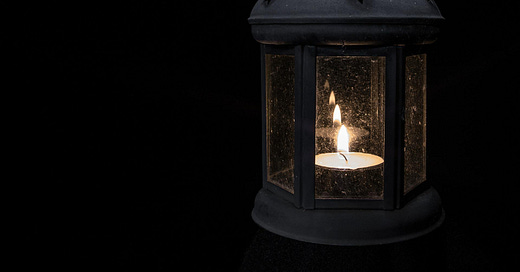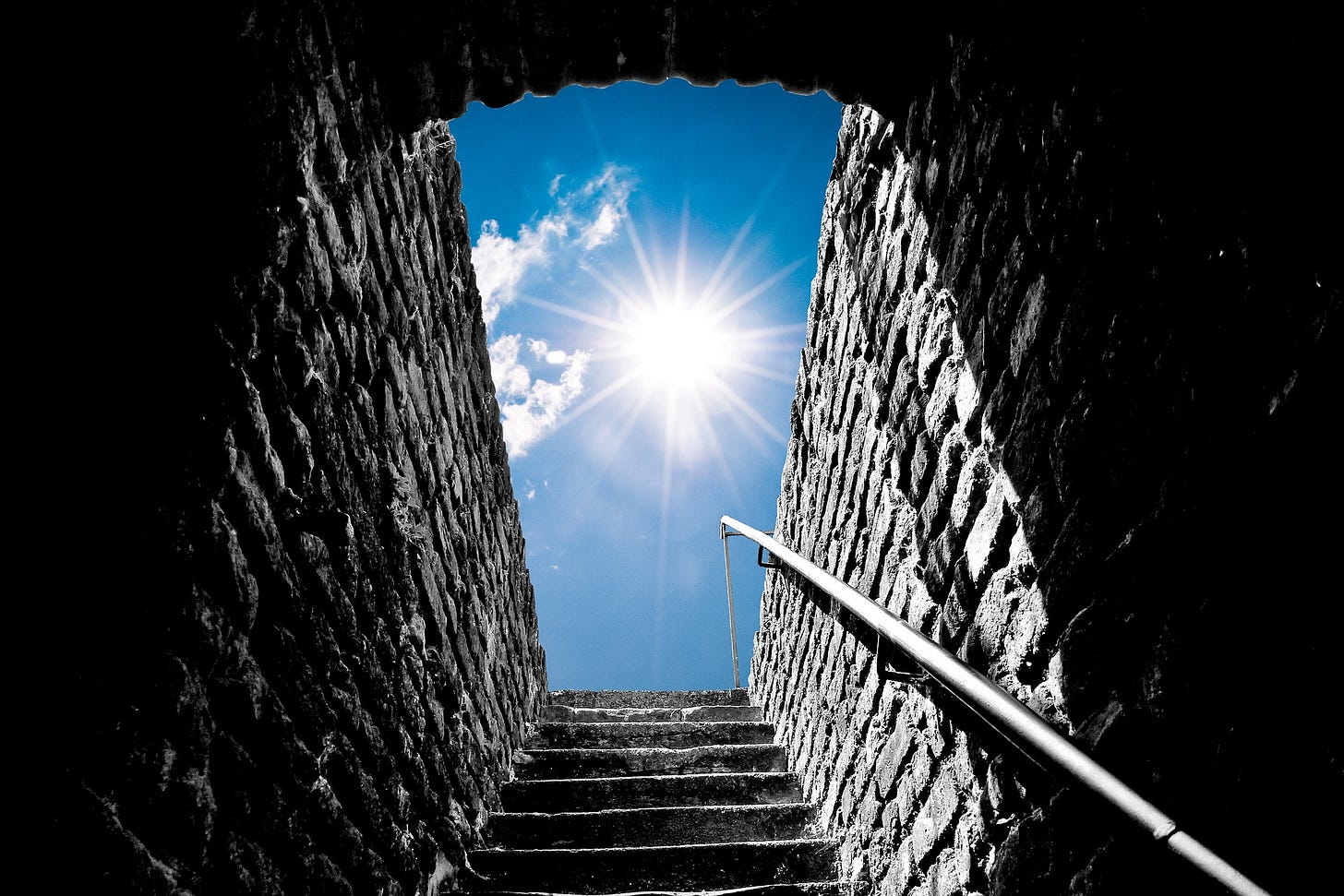My daughter Maddie was sick for almost three years in high school, virtually incapacitated by an undiagnosed illness. During that time, I wrestled with doctors and testing and understanding what healing really is (not just an essay for another day, but an entire book). I also wrestled with hope.
Friends and family would always say, kindly, “I hope she gets better soon,” and I would nod and invariably chime in, “I hope so, too.”
It made sense to hope for that thing, just like hoping for any thing — given the common definition of the word “hope:” “desire accompanied by expectation of or belief in fulfillment.” There’s an imagined, attainable thing that waits on the other side of hoping. In my case, it was a person: Maddie, healthy.
Sometimes our hopes are less specific: I hope for clarity, or for a better future for our planet — to take two more examples from my own life. Even as I think or say those things, I have something in mind. I believe I know what clarity is, or what a better future will look and feel like.
But what if…
What if you and I are bounded by our narrow human imagination, our understanding of history, or even our own past experience? What if my statements of hope actually limit myself, and constrict the field of infinite possibilities for clarity, for a better future, for anything?
Frank Ostaseski, Buddhist teacher and cofounder of the Zen Hospice Project, writes in his book The Five Invitations:
“To discern the real value of hope, we must draw a line between hope and expectation.”
Drawing that distinction between hope and expectation is helping me redefine hope for myself. I’ve determined that if hope is not an expectation, then it seems futile to hope for any thing, even those things I think sound pretty good for the world — awakening the masses to the lies and deception of the powerful, or bringing justice to corporations whose pursuit of profit endangers others, for example — because that would confuse hope with expectation.
(By the way, I do pray for those things, because I think asking for help from higher powers is necessary for divine intercession. But now I don’t confuse my prayers with expressions of hope.
This little parenthetical interlude also gives me the opportunity to briefly address the concept of “false hope.” I’ve always been instinctively annoyed by that phrase, and now I know why: it’s attached to the conventional definition of hope. However, if you uncouple hope from its expected outcome, disappointment becomes impossible, and then there can be no such thing as “false hope.”)
So if hope is not expectation, what is it?
South African Anglican bishop and theologian Desmond Tutu, known for his work as an anti-apartheid and human rights activist, characterized it as “being able to see that there is light despite all of the darkness.” He defines hope as an ability. If that is true, then hope must be able to be strengthened. How?
I think it’s by facing and surviving, over and over, the darkness.
I’m lucky in that my disposition has always been naturally optimistic. In my lifetime I’ve rarely felt as though I had to actively cultivate hope. I did so after my mother’s death in 1989, again after 9/11, during Maddie’s illness… and I’m doing it now, after 2020 kicked it into high gear.
Overcoming hardship fosters both resilience AND hope. I can look back at those difficult events in my life and see my path illuminated in ways I couldn’t discern at the time. I can see how each adversity made space for new growth, how every despair watered seeds of joy.
Moving through darkness again and again deepens our capacity for hope, because we begin to train our eyes to see the light.
Playwright, dissident, and former president of both Czechoslovakia and the Czech Republic, Vaclav Havel grew intimate with the elusive concept of hope, calling it “an orientation of the spirit.” He should know. His political activities brought him under the constant surveillance of the secret police, and he was imprisoned on multiple occasions, including a four-year stint for his actions on behalf of human rights in Czechoslovakia.
I can only imagine his time in prison was a kind of crucible, a place where his definition of hope was forged out of direct dialogue with despair. What did Havel mean by “an orientation of the spirit”? I can’t know for sure, but I have my own interpretation.
I think of it as an attitude of pure possibility, a state of positive curiosity, an opening to ALL potentialities. I know when I’m in it, because I feel sort of infinitely receptive. I have no internal barriers to what is presenting itself. It’s like the sublime Rumi poem:
The Guest House
This being human is a guest house.
Every morning a new arrival.A joy, a depression, a meanness,
some momentary awareness comes
As an unexpected visitor.Welcome and entertain them all!
Even if they’re a crowd of sorrows,
who violently sweep your house
empty of its furniture,
still treat each guest honorably.
He may be clearing you out
for some new delight.The dark thought, the shame, the malice,
meet them at the door laughing,
and invite them in.Be grateful for whoever comes,
because each has been sent
as a guide from beyond.— Jalaluddin Rumi, translation by Coleman Barks (The Essential Rumi)
Hope is standing in the doorway of the house of life, arms wide open.
Which brings me to acceptance.
Acceptance has always tripped me up, because I misunderstood it. I thought it meant acquiescence: going along to get along, taking anything I was given, or going with the flow. I thought it was a prescription for passivity.
It was only recently that I realized I had it wrong. Acceptance is not COOPERATING with reality the way it is, it’s SEEING reality the way it is, warts and all. It’s staring reality in the face without turning away.
Let’s take Maddie’s illness as an example. Accepting that she was sick did not mean giving up on finding a cure. It did challenge me, however, to give up hoping for a different reality.
You’ll notice in Rumi’s poem that he names every visitor to his house: A joy, a depression, a meanness…The dark thought, the shame, the malice. None of them passes through his threshold unseen. He feels each one. He accepts each one.
Only after acceptance comes his gratitude, because he knows that each darkness carries some light.
This is the task of Havel’s orientation of the spirit. This is the task of cultivating hope.
As my awareness of political and social dysfunction grows daily, this task sometimes feels Herculean. There are days when I am flattened.
What I've discovered is that in those moments when hope vanishes, I find that I’m not truly accepting the world as it is. I’m either looking ahead, imagining a bleak outcome — increased censorship, further power consolidation, advancing authoritarianism — which locates me in the very cold, dystopian future I reject, or looking behind, cataloguing the disappointments I’ve experienced in the past to justify some self-protective pessimism.
If, however, I drag myself back, kicking and screaming, into the present moment, I am constantly surprised to find that I can warm myself with a tiny flicker of hope. Why? Because hope always abides in the present. I’ll say it again:
Hope always abides in the present.
The world right now seems so irredeemably effed up, in every possible direction, it’s hard to imagine how it’s going to right itself. Maybe that’s why I’m so willing to put this new concept of hope into action. For the first time in my life, I don’t have any idea how to fix the enormity of our situation, what is really going on, or what I can do to make a significant difference.
Except for this: I can orient my spirit toward hope. It’s something any of us can do, and something we must do, for persistent hope always defeats tyranny. History has taught us that lesson through great spirits like Gandhi, Nelson Mandela, Aleksandr Solzhenitsyn, Lech Wałęsa, and Elie Wiesel — individuals whose very breath fanned the spark of hope during the darkest of times. Perhaps that is the purpose of darkness: to draw from within us our innate capacity for hope.
Perhaps. I don’t know.
So I locate myself in the present, accept the whole mess of the world as a reality right now, and still trust that all of us, holding in our powerful hearts the field of infinite possibility for something holy to arise from the ashes, will lure that inconceivable holiness out of the present and into the future.







I love this piece of writing, Mary. As I go through your previous postings, I think I find them all evocative and inspiring. Keep up the good work. We just can't have enough writers like you who give voice to our deepest internal stirrings.
Lovely. …For your daughter, while I don’t mean to be surreptitious, active cannabinoids are plentiful when the system is functionally efficient.